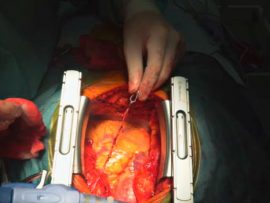Abstract Bleeding following cardiac surgery that warrants transfusion of blood products is associated with significant complications, including increased mortality at 1 year following surgery. Factor concentrates, such as prothrombin complex..
Read MoreAbstract It is established that coronaviruses are transmitted most through aerosols produced when an infected individual coughs or sneezes. Although there is no clear evidence of person-to-person airborne transmission, it is..
Read MoreAbstract Severe acute respiratory syndrome coronavirus 2 (SARS-CoV-2) has become a major worldwide health threat in just a few weeks. ICU admission and the recourse to extracorporeal organ support, such..
Read MoreAbstract Delirium and postoperative neurocognitive disorder are the commonest perioperative complications in patients more than 65 yr of age. However, data suggest that we often fail to screen patients for..
Read MoreAbstract Purpose Cardiac complications are common after spontaneous intracerebral hemorrhage (ICH). In this study we intended to investigate factors associated with higher alterations in heart rate and their impact on..
Read MoreAbstract Rapid global spread of severe acute respiratory syndrome coronavirus 2 (SARS-CoV-2) and the resultant clinical illness, coronavirus disease 2019 (COVID-19), drove the World Health Organization to declare COVID-19 a..
Read MoreAbstract Background Cardiac surgery is known to induce acute endothelial dysfunction, which may be central to the pathophysiology of postoperative complications. Preoperative endothelial dysfunction could also be implicated in the..
Read MoreAbstract Background Acute kidney injury (AKI) is a frequent and serious complication of cardiac surgery, associated with a high incidence of morbidity and mortality. Although the RIFLE criteria serve as..
Read MoreAbstract Background Treating severe forms of the acute respiratory distress syndrome and cardiac failure, extracorporeal membrane oxygenation (ECMO) has become an established therapeutic option. Neonatal or pediatric patients receiving ECMO,..
Read MoreAbstract Background The perioperative complications in patients with coronary artery disease undergoing coronary artery bypass graft (CABG) surgery have been reported predominantly from developed countries, with a paucity of data..
Read MoreAbstract Background Bleeding as a complication is associated with poorer results in cardiac surgery. There is increasing evidence that the use of blood products is an independent factor of increased..
Read MoreAbstract Although advances in knowledge and technology have improved outcomes in surgical cardiac patients over the last decade, complications following cardiac operations still remain to be potentially fatal. Gastrointestinal complications,..
Read MoreIncreased Cerebral Mitochondrial Dysfunction and Reactive Oxygen Species with Cardiopulmonary Bypass
Abstract Objectives Neurodevelopmental injury after cardiac surgery using cardiopulmonary bypass (CPB) for congenital heart defects is common, but the mechanism behind this injury is unclear. This study examines the impact..
Read MoreAbstract Background We designed a prospective randomized clinical study to compare unilateral and bilateral antegrade cerebral perfusion (ACP) under moderate hypethermia in open distal aortic hemiarch replacement in ascending aortic..
Read MoreAbstract Introduction Anemia and blood transfusion are risk factors for morbidity/mortality in patients undergoing cardiac surgery with cardiopulmonary bypass (CPB). The objective of this study is to analyze the association..
Read MoreAbstract The new coronavirus infection, which was first seen in China in late December, 2019 and eventually became a worldwide pandemic, poses a serious threat to public health. After a..
Read MoreAbstract Background Recent military and civilian experience suggests that fresh whole blood may be the preferred for treatment of hemorrhagic shock, but its use is limited by its 21-day shelf life. The red..
Read MoreAbstract Background Bloodstream infection (BSI) is an important complication of extracorporeal membranous oxygenation (ECMO) and a major cause of mortality. This study evaluated the epidemiological and clinical characteristics of BSI..
Read MoreAbstract Objective Preoperative anemia management reduces red blood cell (RBC) transfusion and adverse outcomes, but how best to optimize the patient’s hemoglobin (Hgb) before cardiac surgery remains unclear. The authors..
Read MoreIntroduction Lactic acidosis after cardiac surgery with cardiopulmonary bypass is common and associated with an increase in postoperative morbidity and mortality. A number of potential causes for an elevated lactate..
Read MoreBackground There is a lack of consensus on how to manage anticoagulation during veno-venous extracorporeal membrane oxygenation, including antithrombin monitoring and supplementation. The authors’ aim was to determine current practice..
Read MoreThe use of veno-arterial extracorporeal membrane oxygenation (VA-ECMO) as a salvage therapy in cardiogenic shock is becoming of current practice. While VA-ECMO is potentially a life-saving technique, results are sometimes mitigated, emphasising the need for selecting..
Read MoreVenoarterial extracorporeal membrane oxygenation has emerged as a viable treatment for patients in cardiogenic shock with biventricular failure and pulmonary dysfunction. Advances in pump and oxygenator technology, cannulation strategies, patient selection and management, and durable mechanical circulatory support have..
Read MoreAbstract Extracorporeal membrane oxygenation (ECMO) refers to specific mechanical devices used to temporarily support the failing heart and/or lung. Technological advances as well as growing collective knowledge and experience have..
Read MoreBackground Venoarterial extracorporeal membrane oxygenation (V-A ECMO) improves perfusion and oxygenation in patients with cardiogenic shock. However, it can also result in supranormal oxygen exposure. Recent evidence suggests hyperoxia may..
Read MoreBackground Post-cardiotomy cardiogenic shock (PCCS) has an incidence of 2–6 % after routine adult cardiac surgery. 0.5–1.5 % are refractory to inotropic and intra-aortic balloon pump (IABP) support. Advanced mechanical circulatory support..
Read MoreBackground Postcardiotomy cardiogenic shock (PCCS) refractory to inotropic support and intra-aortic balloon pump (IABP) occurs rarely but is almost universally fatal without mechanical circulatory support. In this systematic review and..
Read MoreBackground The efficacy of extracorporeal membrane oxygenation (ECMO) in bridging children with unrepaired heart defects to a definitive or palliative surgical procedure has been rarely reported. The goal of this..
Read MoreBACKGROUND: No consensus exists on the optimal settings of mechanical ventilation during veno-venous extracorporeal membrane oxygenation (ECMO). Our aim was to describe how mechanical ventilation and related interventions are managed..
Read MoreSevere cases of coronavirus disease 2019 (COVID-19) cannot be adequately managed with mechanical ventilation alone. The role and outcome of extracorporeal membrane oxygenation (ECMO) in the management of COVID-19 is..
Read More













